Unit 2 How often do you exercise?重难点汇总及练习(含答案)人教版英语八年级上册
文档属性
| 名称 | Unit 2 How often do you exercise?重难点汇总及练习(含答案)人教版英语八年级上册 | 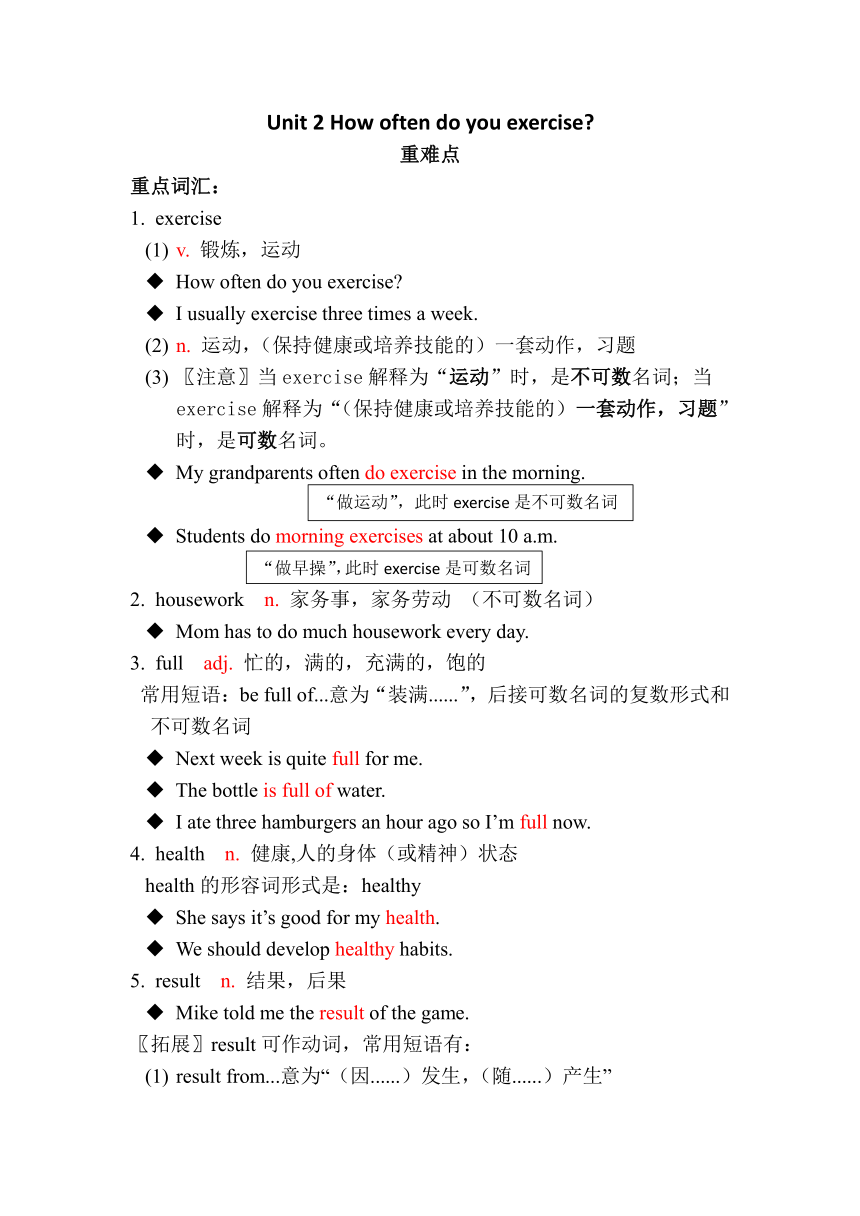 | |
| 格式 | docx | ||
| 文件大小 | 43.3KB | ||
| 资源类型 | 教案 | ||
| 版本资源 | 人教新目标(Go for it)版 | ||
| 科目 | 英语 | ||
| 更新时间 | 2023-08-26 22:49:03 | ||
图片预览

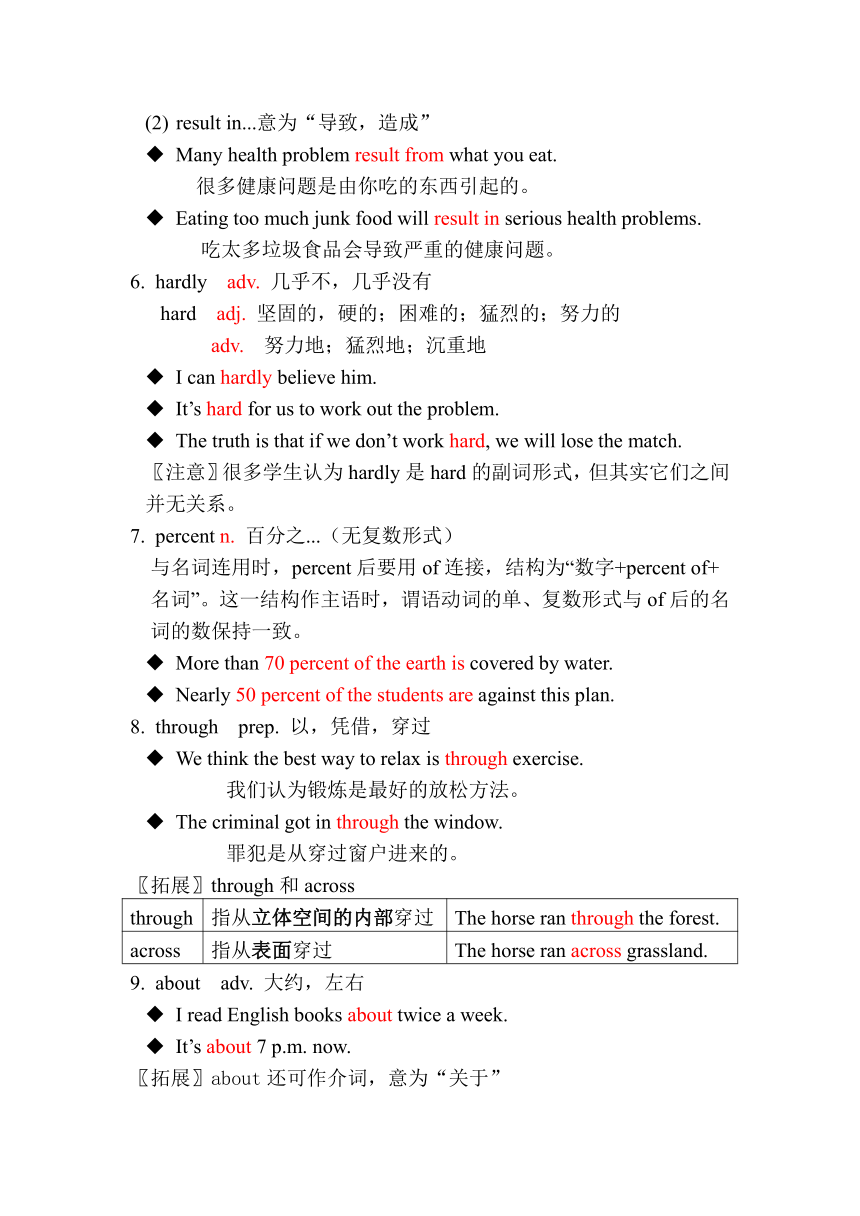
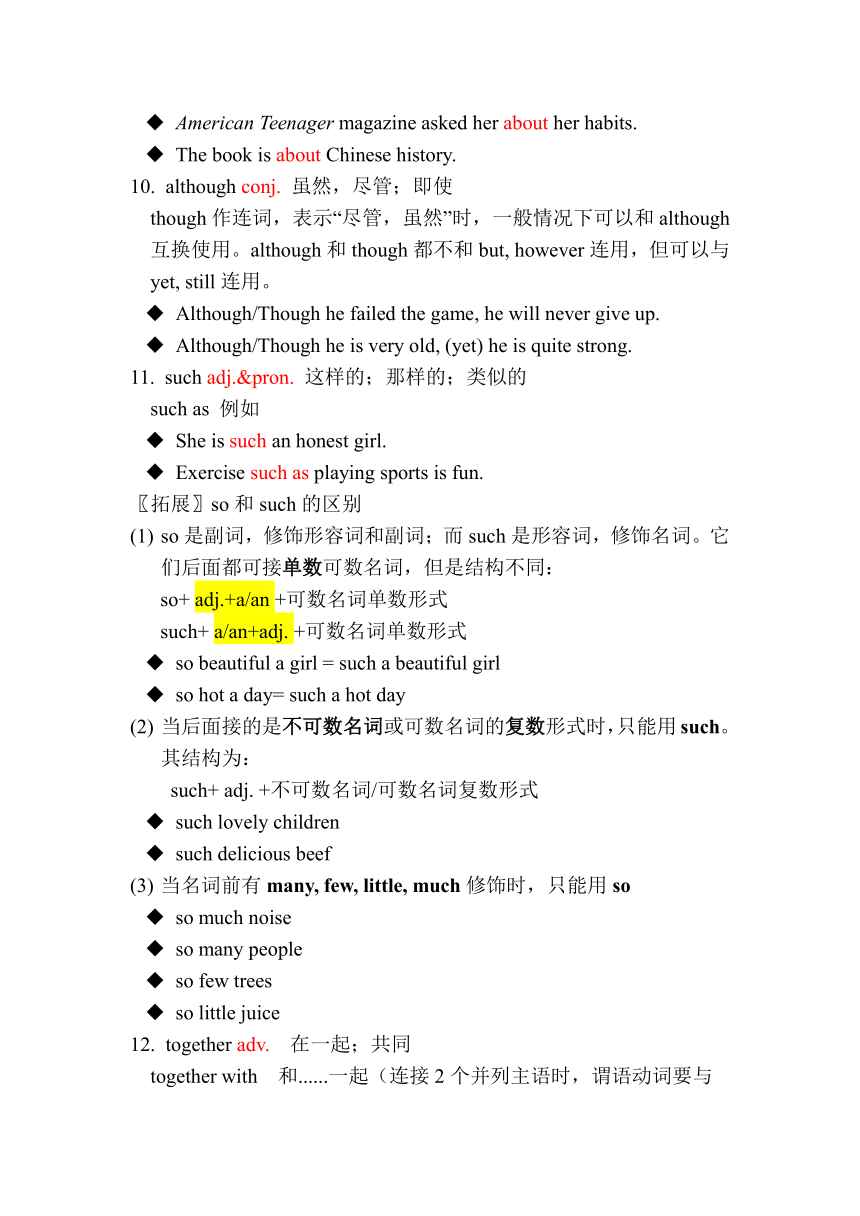
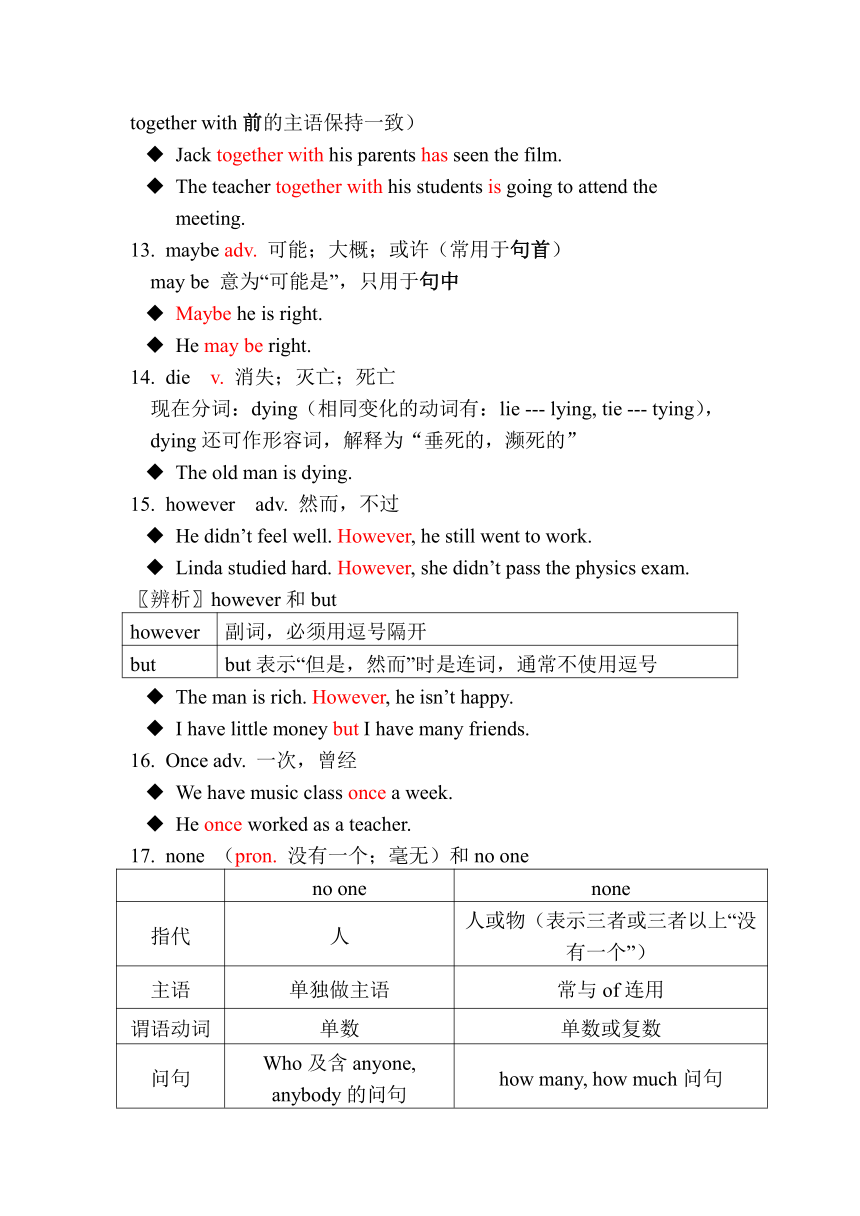
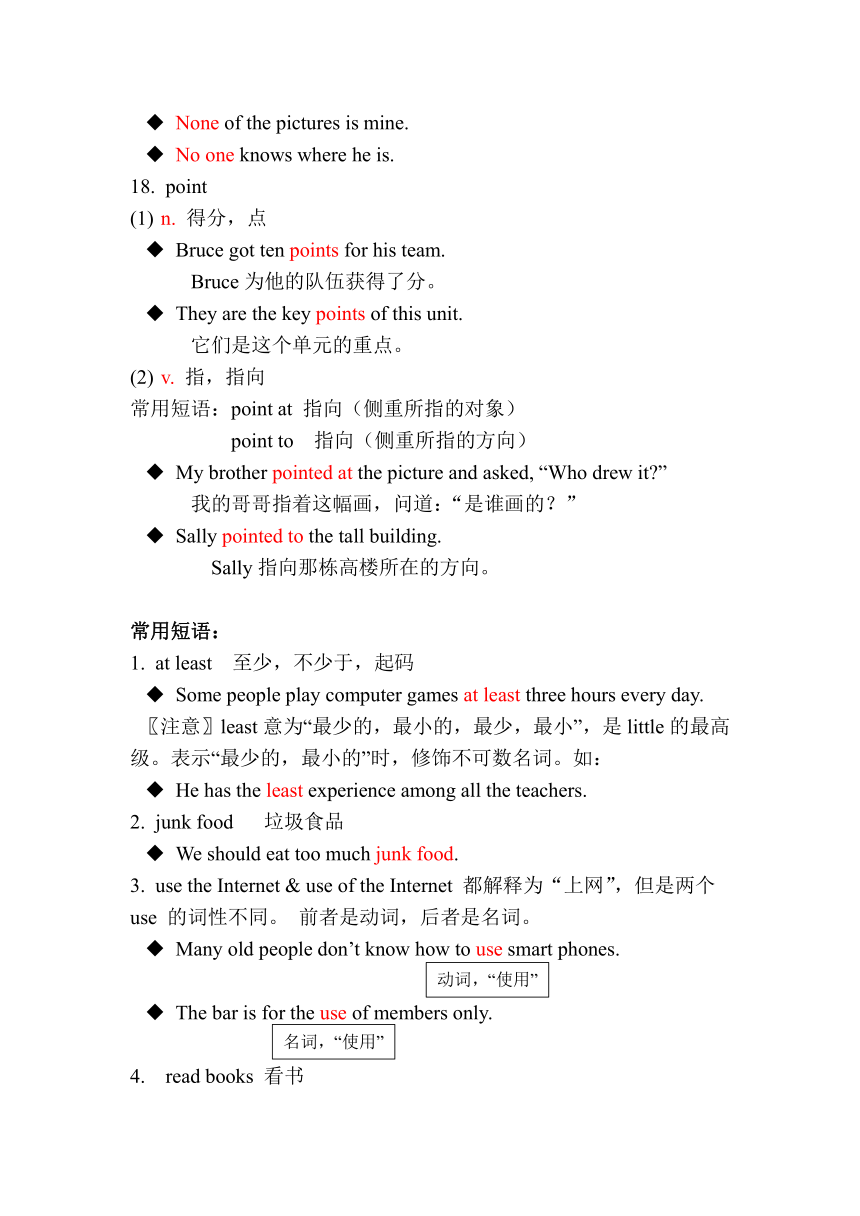
文档简介
Unit 2 How often do you exercise
重难点
重点词汇:
exercise
v. 锻炼,运动
How often do you exercise
I usually exercise three times a week.
n. 运动,(保持健康或培养技能的)一套动作,习题
〖注意〗当exercise解释为“运动”时,是不可数名词;当exercise解释为“(保持健康或培养技能的)一套动作,习题”时,是可数名词。
My grandparents often do exercise in the morning.
Students do morning exercises at about 10 a.m.
housework n. 家务事,家务劳动 (不可数名词)
Mom has to do much housework every day.
full adj. 忙的,满的,充满的,饱的
常用短语:be full of...意为“装满......”,后接可数名词的复数形式和不可数名词
Next week is quite full for me.
The bottle is full of water.
I ate three hamburgers an hour ago so I’m full now.
health n. 健康,人的身体(或精神)状态
health的形容词形式是:healthy
She says it’s good for my health.
We should develop healthy habits.
result n. 结果,后果
Mike told me the result of the game.
〖拓展〗result可作动词,常用短语有:
result from...意为“(因......)发生,(随......)产生”
result in...意为“导致,造成”
Many health problem result from what you eat.
很多健康问题是由你吃的东西引起的。
Eating too much junk food will result in serious health problems.
吃太多垃圾食品会导致严重的健康问题。
hardly adv. 几乎不,几乎没有
hard adj. 坚固的,硬的;困难的;猛烈的;努力的
adv. 努力地;猛烈地;沉重地
I can hardly believe him.
It’s hard for us to work out the problem.
The truth is that if we don’t work hard, we will lose the match.
〖注意〗很多学生认为hardly是hard的副词形式,但其实它们之间并无关系。
percent n. 百分之...(无复数形式)
与名词连用时,percent后要用of连接,结构为“数字+percent of+名词”。这一结构作主语时,谓语动词的单、复数形式与of后的名词的数保持一致。
More than 70 percent of the earth is covered by water.
Nearly 50 percent of the students are against this plan.
through prep. 以,凭借,穿过
We think the best way to relax is through exercise.
我们认为锻炼是最好的放松方法。
The criminal got in through the window.
罪犯是从穿过窗户进来的。
〖拓展〗through和across
through 指从立体空间的内部穿过 The horse ran through the forest.
across 指从表面穿过 The horse ran across grassland.
about adv. 大约,左右
I read English books about twice a week.
It’s about 7 p.m. now.
〖拓展〗about还可作介词,意为“关于”
American Teenager magazine asked her about her habits.
The book is about Chinese history.
although conj. 虽然,尽管;即使
though作连词,表示“尽管,虽然”时,一般情况下可以和although互换使用。although和though都不和but, however连用,但可以与yet, still连用。
Although/Though he failed the game, he will never give up.
Although/Though he is very old, (yet) he is quite strong.
such adj.&pron. 这样的;那样的;类似的
such as 例如
She is such an honest girl.
Exercise such as playing sports is fun.
〖拓展〗so和such的区别
so是副词,修饰形容词和副词;而such是形容词,修饰名词。它们后面都可接单数可数名词,但是结构不同:
so+ adj.+a/an +可数名词单数形式
such+ a/an+adj. +可数名词单数形式
so beautiful a girl = such a beautiful girl
so hot a day= such a hot day
当后面接的是不可数名词或可数名词的复数形式时,只能用such。其结构为:
such+ adj. +不可数名词/可数名词复数形式
such lovely children
such delicious beef
当名词前有many, few, little, much修饰时,只能用so
so much noise
so many people
so few trees
so little juice
together adv. 在一起;共同
together with 和......一起(连接2个并列主语时,谓语动词要与together with前的主语保持一致)
Jack together with his parents has seen the film.
The teacher together with his students is going to attend the meeting.
maybe adv. 可能;大概;或许(常用于句首)
may be 意为“可能是”,只用于句中
Maybe he is right.
He may be right.
die v. 消失;灭亡;死亡
现在分词:dying(相同变化的动词有:lie --- lying, tie --- tying),dying还可作形容词,解释为“垂死的,濒死的”
The old man is dying.
however adv. 然而,不过
He didn’t feel well. However, he still went to work.
Linda studied hard. However, she didn’t pass the physics exam.
〖辨析〗however和but
however 副词,必须用逗号隔开
but but表示“但是,然而”时是连词,通常不使用逗号
The man is rich. However, he isn’t happy.
I have little money but I have many friends.
Once adv. 一次,曾经
We have music class once a week.
He once worked as a teacher.
none (pron. 没有一个;毫无)和no one
no one none
指代 人 人或物(表示三者或三者以上“没有一个”)
主语 单独做主语 常与of连用
谓语动词 单数 单数或复数
问句 Who及含anyone, anybody的问句 how many, how much问句
None of the pictures is mine.
No one knows where he is.
point
n. 得分,点
Bruce got ten points for his team.
Bruce为他的队伍获得了分。
They are the key points of this unit.
它们是这个单元的重点。
v. 指,指向
常用短语:point at 指向(侧重所指的对象)
point to 指向(侧重所指的方向)
My brother pointed at the picture and asked, “Who drew it ”
我的哥哥指着这幅画,问道:“是谁画的?”
Sally pointed to the tall building.
Sally指向那栋高楼所在的方向。
常用短语:
at least 至少,不少于,起码
Some people play computer games at least three hours every day.
〖注意〗least意为“最少的,最小的,最少,最小”,是little的最高级。表示“最少的,最小的”时,修饰不可数名词。如:
He has the least experience among all the teachers.
junk food 垃圾食品
We should eat too much junk food.
use the Internet & use of the Internet 都解释为“上网”,但是两个 use 的词性不同。 前者是动词,后者是名词。
Many old people don’t know how to use smart phones.
The bar is for the use of members only.
read books 看书
Kate enjoys reading books.
〖辨析〗read, watch, look, see
read 用于看报纸、杂志、书籍等(newspaper, magazine, book...)
watch 用于观看动态的画面(TV, football game, movie...)
look 解释为“看”时,须与at连用,即look at sb./sth.
see 意为“看到”,强调看到的结果
My dad usually read a newspaper in the morning.
Tim watched the football game last night.
She is looking at a picture.
I saw a cute cat in the garden.
go to the movies 去看电影
My sister went to the movies with her friends.
〖拓展〗go to the cinema也表示“去看电影”
stay up late 深夜不睡,熬夜
It’s bad for our health to stay up late.
play sports 进行体育运动(意义与do exercise相近)
My son is so lazy that he never plays sports.
Bill plays sports three or four times a week.
want sb. to do sth. 想要(某人)做某事
Mom wants me to help with housework.
Mary wants to eat ice-cream.
be good for... 对......有益
Too much sun is not good for you.
It’s good for you to read books.
〖拓展〗be good for 的反义短语是be bad for,意为“对......有害,不利于......”
more than 意为“多于,超过”,其后常接表示数量的词,相当于over;翻译短语为
less than,意为“少于”
There are more than 100 people knowing the news.
The young lady is less than 20 years old.
free time activities 课余活动
I don’t have any free time activities.
Students should take part in some free time activities.
not...at all 一点也不......
She doesn’t like the movie at all.
The little girl didn’t know what happened at all.
〖拓展〗not at all还可解释为“不客气”,相当于You’re welcome.
--Thanks for helping me with my math.
--Not at all.
go online 上网
I often go online to get some information.
the answers to our questions 我们问题的答案
其中to解释为“关于,对于”,表示两个事物之间的关系,类似的短语还有:
the solution to the problem 解决这个问题的办法
the key to the door 这个门的钥匙
the way to do sth. 做某事的方法
其中way解释为“方式,方法,手段”,way之前可用形容词或形容词性物主代词进行修饰,如:
I think it’s the right way to solve the problem.
I don’t like her way to talk to me.
〖拓展〗way还可解释为“道路,路线,路”,如:
Could you tell me the way to the post office
spend time with sb. 和某人一起度过时光
I enjoy spending time with my family.
〖辨析〗spend, cost, take, pay
主语 常用搭配
spend 人 sb. spend(s)+ 时间/金钱 + on sth. sb. spend(s)+ 时间/金钱 +(in) doing sth.
cost 物 sth.cost(s) (sb.)+ 金钱
take it It takes sb.+ 时间 + to do sth.
pay 人 sb. pay(s) for sth. sb. pay(s)+ 金钱 + for sth.
Sam spent 200 dollars on the bike.
Rose spent two days (in) drawing the picture.
The bike cost (Sam) 200 dollars.
It took Rose two days to draw the picture.
Sam payed for the bike.
Sam payed 200 dollars for the bike.
go to the dentist 去看牙医
相似短语:go to the doctor 去看医生
a 16-year-old high school girl 一个16岁的高中女孩
其中16-year-old是形容词性质,意为“16岁的”;“数字-year-old”表示“......岁的”,如:
Alex is an eight-year-old boy.
help with sth. 帮助做某事
help sb. (to) do sth. 帮助某人作某事
My brother often helps with my physics.
She never helps her mother (to) do chores.
表示频率的词组结构:次数+时间
once a week 一周1次
twice a month 一月2次
once every two weeks 每两周1次
how often, how soon, how long, how many times
how often “多久一次”,询问做事情的频率
how soon “还要多久”,常用于将来时态,答语通常是用in引导的时间状语
how long “多长时间”,询问做某事的时长
how many times “多少次”,询问次数
---How often do you exercise
---I exercise three times a week.
---How soon will we reach Nanchang
---In 30 minutes.
---How long have you been an engineer
---For 15 years.
---How many times have you been to the science museum
---Four times.
单元语法:
频度副词
频度副词表示事情发生的频率,可用来回答how often引导的问句。
How often do you go to the movies
常用的频度副词有:
always, usually, often, sometimes, hardly ever, never等。其表示的频率由高到低排列如下:
always>usually>often>sometimes>hardly ever>never
表示具体的频率、次数时,可用once, twice或“基数词+times”表示,如:
We visit our grandparents once a week.
The doctor asked me to take medicine three times a day.
频度副词在句中的位置:
实义动词之前
I usually go to the movies once a month.
助动词、情态动词之后
My father doesn’t often sing.
I will never forget you.
be动词之后
She is always looking nice.
有时也可置于句首或句尾。
Sometimes he works at home.
练习:
一、单项选择
1.They feel tired. ______ , they still go on working.
A.And B.But C./ D.However
2.My grandmother is healthy because she often ______.
A.exercises B.smokes C.sleeps D.sings
3.—______does Cindy take a guitar lesson
—Twice a week.
A.How soon B.How much C.How many D.How often
4.His mother doesn’t want him______at home today.
A.stays B.stayed C.to stay D.staying
5.Here______the results______the survey.
A.is;with B.are;of C.is;of D.are;with
6.Mary’s uncle ______ our new P.E. teacher.
A.maybe B.may be C.may D.perhaps
7.The poor dog is ______ .
A.were dead B.died C.dying D.death
8.We usually go hiking ______.
A.one a year B.once a year C.one the year D.once year
9.Smoking______your health.
A.is good for B.is bad for C.is good to D.is bad to
10.The answers ______ these questions are ______.
A.of;different B.to;different
C.of;difference D.to;difference
二、用所给词的正确形式填空
How often______you ______(eat) out
He ______(visit) the museum once a month.
Her sister usually______(go) shopping on weekends.
My brother ______( not eat) carrots.
We should try______(learn) to protect ourselves.
Only fifteen ______ (percent) of the students exercise every day.
Sara is ______(health) because of her eating______(habit).
Her dress is ______(difference)from mine.
Mom wants me______(drink) milk every day. She ______(think) it's good for my health.
My father likes ______(watch) TV after supper.
三、完成句子
1. 我认为最好的放松的方法是通过听音乐。
I think the best ________ ________ relax is through listening to music.
2. 他每天上网至少两个小时。
He uses the Internet for ________ ________ two hours a day.
3. 海伦一点都不喜欢这首歌。
Helen ________ like the song________ ______.
4. 你每晚睡几个小时?
________ ________ ________ do you sleep every night
5. 格蕾丝是一个13岁的中学生。
Grace is ________ ________ middle school student.
一、单项选择
DADCB BCBBB
二、用所给词的正确形式填空
1. do; eat 2. visits 3. goes 4. doesn’t eat 5. to learn
6.percent 7.healthy; habits 8.different 9.to drink; thinks
10.watching
三、完成句子
1.way;to 2. at least 3. doesn’t; at all 4. How many hours
5. a 13-year-old
重难点
重点词汇:
exercise
v. 锻炼,运动
How often do you exercise
I usually exercise three times a week.
n. 运动,(保持健康或培养技能的)一套动作,习题
〖注意〗当exercise解释为“运动”时,是不可数名词;当exercise解释为“(保持健康或培养技能的)一套动作,习题”时,是可数名词。
My grandparents often do exercise in the morning.
Students do morning exercises at about 10 a.m.
housework n. 家务事,家务劳动 (不可数名词)
Mom has to do much housework every day.
full adj. 忙的,满的,充满的,饱的
常用短语:be full of...意为“装满......”,后接可数名词的复数形式和不可数名词
Next week is quite full for me.
The bottle is full of water.
I ate three hamburgers an hour ago so I’m full now.
health n. 健康,人的身体(或精神)状态
health的形容词形式是:healthy
She says it’s good for my health.
We should develop healthy habits.
result n. 结果,后果
Mike told me the result of the game.
〖拓展〗result可作动词,常用短语有:
result from...意为“(因......)发生,(随......)产生”
result in...意为“导致,造成”
Many health problem result from what you eat.
很多健康问题是由你吃的东西引起的。
Eating too much junk food will result in serious health problems.
吃太多垃圾食品会导致严重的健康问题。
hardly adv. 几乎不,几乎没有
hard adj. 坚固的,硬的;困难的;猛烈的;努力的
adv. 努力地;猛烈地;沉重地
I can hardly believe him.
It’s hard for us to work out the problem.
The truth is that if we don’t work hard, we will lose the match.
〖注意〗很多学生认为hardly是hard的副词形式,但其实它们之间并无关系。
percent n. 百分之...(无复数形式)
与名词连用时,percent后要用of连接,结构为“数字+percent of+名词”。这一结构作主语时,谓语动词的单、复数形式与of后的名词的数保持一致。
More than 70 percent of the earth is covered by water.
Nearly 50 percent of the students are against this plan.
through prep. 以,凭借,穿过
We think the best way to relax is through exercise.
我们认为锻炼是最好的放松方法。
The criminal got in through the window.
罪犯是从穿过窗户进来的。
〖拓展〗through和across
through 指从立体空间的内部穿过 The horse ran through the forest.
across 指从表面穿过 The horse ran across grassland.
about adv. 大约,左右
I read English books about twice a week.
It’s about 7 p.m. now.
〖拓展〗about还可作介词,意为“关于”
American Teenager magazine asked her about her habits.
The book is about Chinese history.
although conj. 虽然,尽管;即使
though作连词,表示“尽管,虽然”时,一般情况下可以和although互换使用。although和though都不和but, however连用,但可以与yet, still连用。
Although/Though he failed the game, he will never give up.
Although/Though he is very old, (yet) he is quite strong.
such adj.&pron. 这样的;那样的;类似的
such as 例如
She is such an honest girl.
Exercise such as playing sports is fun.
〖拓展〗so和such的区别
so是副词,修饰形容词和副词;而such是形容词,修饰名词。它们后面都可接单数可数名词,但是结构不同:
so+ adj.+a/an +可数名词单数形式
such+ a/an+adj. +可数名词单数形式
so beautiful a girl = such a beautiful girl
so hot a day= such a hot day
当后面接的是不可数名词或可数名词的复数形式时,只能用such。其结构为:
such+ adj. +不可数名词/可数名词复数形式
such lovely children
such delicious beef
当名词前有many, few, little, much修饰时,只能用so
so much noise
so many people
so few trees
so little juice
together adv. 在一起;共同
together with 和......一起(连接2个并列主语时,谓语动词要与together with前的主语保持一致)
Jack together with his parents has seen the film.
The teacher together with his students is going to attend the meeting.
maybe adv. 可能;大概;或许(常用于句首)
may be 意为“可能是”,只用于句中
Maybe he is right.
He may be right.
die v. 消失;灭亡;死亡
现在分词:dying(相同变化的动词有:lie --- lying, tie --- tying),dying还可作形容词,解释为“垂死的,濒死的”
The old man is dying.
however adv. 然而,不过
He didn’t feel well. However, he still went to work.
Linda studied hard. However, she didn’t pass the physics exam.
〖辨析〗however和but
however 副词,必须用逗号隔开
but but表示“但是,然而”时是连词,通常不使用逗号
The man is rich. However, he isn’t happy.
I have little money but I have many friends.
Once adv. 一次,曾经
We have music class once a week.
He once worked as a teacher.
none (pron. 没有一个;毫无)和no one
no one none
指代 人 人或物(表示三者或三者以上“没有一个”)
主语 单独做主语 常与of连用
谓语动词 单数 单数或复数
问句 Who及含anyone, anybody的问句 how many, how much问句
None of the pictures is mine.
No one knows where he is.
point
n. 得分,点
Bruce got ten points for his team.
Bruce为他的队伍获得了分。
They are the key points of this unit.
它们是这个单元的重点。
v. 指,指向
常用短语:point at 指向(侧重所指的对象)
point to 指向(侧重所指的方向)
My brother pointed at the picture and asked, “Who drew it ”
我的哥哥指着这幅画,问道:“是谁画的?”
Sally pointed to the tall building.
Sally指向那栋高楼所在的方向。
常用短语:
at least 至少,不少于,起码
Some people play computer games at least three hours every day.
〖注意〗least意为“最少的,最小的,最少,最小”,是little的最高级。表示“最少的,最小的”时,修饰不可数名词。如:
He has the least experience among all the teachers.
junk food 垃圾食品
We should eat too much junk food.
use the Internet & use of the Internet 都解释为“上网”,但是两个 use 的词性不同。 前者是动词,后者是名词。
Many old people don’t know how to use smart phones.
The bar is for the use of members only.
read books 看书
Kate enjoys reading books.
〖辨析〗read, watch, look, see
read 用于看报纸、杂志、书籍等(newspaper, magazine, book...)
watch 用于观看动态的画面(TV, football game, movie...)
look 解释为“看”时,须与at连用,即look at sb./sth.
see 意为“看到”,强调看到的结果
My dad usually read a newspaper in the morning.
Tim watched the football game last night.
She is looking at a picture.
I saw a cute cat in the garden.
go to the movies 去看电影
My sister went to the movies with her friends.
〖拓展〗go to the cinema也表示“去看电影”
stay up late 深夜不睡,熬夜
It’s bad for our health to stay up late.
play sports 进行体育运动(意义与do exercise相近)
My son is so lazy that he never plays sports.
Bill plays sports three or four times a week.
want sb. to do sth. 想要(某人)做某事
Mom wants me to help with housework.
Mary wants to eat ice-cream.
be good for... 对......有益
Too much sun is not good for you.
It’s good for you to read books.
〖拓展〗be good for 的反义短语是be bad for,意为“对......有害,不利于......”
more than 意为“多于,超过”,其后常接表示数量的词,相当于over;翻译短语为
less than,意为“少于”
There are more than 100 people knowing the news.
The young lady is less than 20 years old.
free time activities 课余活动
I don’t have any free time activities.
Students should take part in some free time activities.
not...at all 一点也不......
She doesn’t like the movie at all.
The little girl didn’t know what happened at all.
〖拓展〗not at all还可解释为“不客气”,相当于You’re welcome.
--Thanks for helping me with my math.
--Not at all.
go online 上网
I often go online to get some information.
the answers to our questions 我们问题的答案
其中to解释为“关于,对于”,表示两个事物之间的关系,类似的短语还有:
the solution to the problem 解决这个问题的办法
the key to the door 这个门的钥匙
the way to do sth. 做某事的方法
其中way解释为“方式,方法,手段”,way之前可用形容词或形容词性物主代词进行修饰,如:
I think it’s the right way to solve the problem.
I don’t like her way to talk to me.
〖拓展〗way还可解释为“道路,路线,路”,如:
Could you tell me the way to the post office
spend time with sb. 和某人一起度过时光
I enjoy spending time with my family.
〖辨析〗spend, cost, take, pay
主语 常用搭配
spend 人 sb. spend(s)+ 时间/金钱 + on sth. sb. spend(s)+ 时间/金钱 +(in) doing sth.
cost 物 sth.cost(s) (sb.)+ 金钱
take it It takes sb.+ 时间 + to do sth.
pay 人 sb. pay(s) for sth. sb. pay(s)+ 金钱 + for sth.
Sam spent 200 dollars on the bike.
Rose spent two days (in) drawing the picture.
The bike cost (Sam) 200 dollars.
It took Rose two days to draw the picture.
Sam payed for the bike.
Sam payed 200 dollars for the bike.
go to the dentist 去看牙医
相似短语:go to the doctor 去看医生
a 16-year-old high school girl 一个16岁的高中女孩
其中16-year-old是形容词性质,意为“16岁的”;“数字-year-old”表示“......岁的”,如:
Alex is an eight-year-old boy.
help with sth. 帮助做某事
help sb. (to) do sth. 帮助某人作某事
My brother often helps with my physics.
She never helps her mother (to) do chores.
表示频率的词组结构:次数+时间
once a week 一周1次
twice a month 一月2次
once every two weeks 每两周1次
how often, how soon, how long, how many times
how often “多久一次”,询问做事情的频率
how soon “还要多久”,常用于将来时态,答语通常是用in引导的时间状语
how long “多长时间”,询问做某事的时长
how many times “多少次”,询问次数
---How often do you exercise
---I exercise three times a week.
---How soon will we reach Nanchang
---In 30 minutes.
---How long have you been an engineer
---For 15 years.
---How many times have you been to the science museum
---Four times.
单元语法:
频度副词
频度副词表示事情发生的频率,可用来回答how often引导的问句。
How often do you go to the movies
常用的频度副词有:
always, usually, often, sometimes, hardly ever, never等。其表示的频率由高到低排列如下:
always>usually>often>sometimes>hardly ever>never
表示具体的频率、次数时,可用once, twice或“基数词+times”表示,如:
We visit our grandparents once a week.
The doctor asked me to take medicine three times a day.
频度副词在句中的位置:
实义动词之前
I usually go to the movies once a month.
助动词、情态动词之后
My father doesn’t often sing.
I will never forget you.
be动词之后
She is always looking nice.
有时也可置于句首或句尾。
Sometimes he works at home.
练习:
一、单项选择
1.They feel tired. ______ , they still go on working.
A.And B.But C./ D.However
2.My grandmother is healthy because she often ______.
A.exercises B.smokes C.sleeps D.sings
3.—______does Cindy take a guitar lesson
—Twice a week.
A.How soon B.How much C.How many D.How often
4.His mother doesn’t want him______at home today.
A.stays B.stayed C.to stay D.staying
5.Here______the results______the survey.
A.is;with B.are;of C.is;of D.are;with
6.Mary’s uncle ______ our new P.E. teacher.
A.maybe B.may be C.may D.perhaps
7.The poor dog is ______ .
A.were dead B.died C.dying D.death
8.We usually go hiking ______.
A.one a year B.once a year C.one the year D.once year
9.Smoking______your health.
A.is good for B.is bad for C.is good to D.is bad to
10.The answers ______ these questions are ______.
A.of;different B.to;different
C.of;difference D.to;difference
二、用所给词的正确形式填空
How often______you ______(eat) out
He ______(visit) the museum once a month.
Her sister usually______(go) shopping on weekends.
My brother ______( not eat) carrots.
We should try______(learn) to protect ourselves.
Only fifteen ______ (percent) of the students exercise every day.
Sara is ______(health) because of her eating______(habit).
Her dress is ______(difference)from mine.
Mom wants me______(drink) milk every day. She ______(think) it's good for my health.
My father likes ______(watch) TV after supper.
三、完成句子
1. 我认为最好的放松的方法是通过听音乐。
I think the best ________ ________ relax is through listening to music.
2. 他每天上网至少两个小时。
He uses the Internet for ________ ________ two hours a day.
3. 海伦一点都不喜欢这首歌。
Helen ________ like the song________ ______.
4. 你每晚睡几个小时?
________ ________ ________ do you sleep every night
5. 格蕾丝是一个13岁的中学生。
Grace is ________ ________ middle school student.
一、单项选择
DADCB BCBBB
二、用所给词的正确形式填空
1. do; eat 2. visits 3. goes 4. doesn’t eat 5. to learn
6.percent 7.healthy; habits 8.different 9.to drink; thinks
10.watching
三、完成句子
1.way;to 2. at least 3. doesn’t; at all 4. How many hours
5. a 13-year-old
同课章节目录
- Unit 1 Where did you go on vacation?
- Section A
- Section B
- Unit 2 How often do you exercise?
- Section A
- Section B
- Unit 3 I'm more outgoing than my sister.
- Section A
- Section B
- Unit 4 What's the best movie theater?
- Section A
- Section B
- Unit 5 Do you want to watch a game show?
- Section A
- Section B
- Unit 6 I'm going to study computer science.
- Section A
- Section B
- Unit 7 Will people have robots?
- Section A
- Section B
- Unit 8 How do you make a banana milk shake?
- Section A
- Section B
- Unit 9 Can you come to my party?
- Section A
- Section B
- Unit 10 If you go to the party, you'll have a grea
- Section A
- Section B
